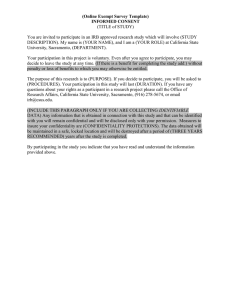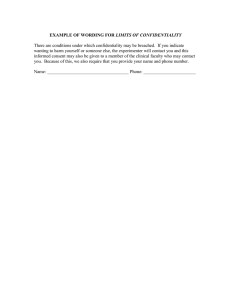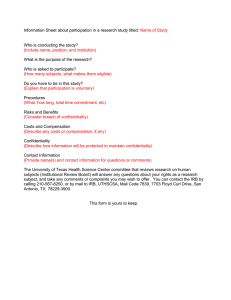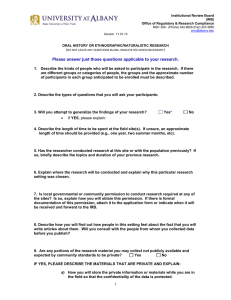September 2008: The differences between protecting privacy and maintaining confidentiality
advertisement
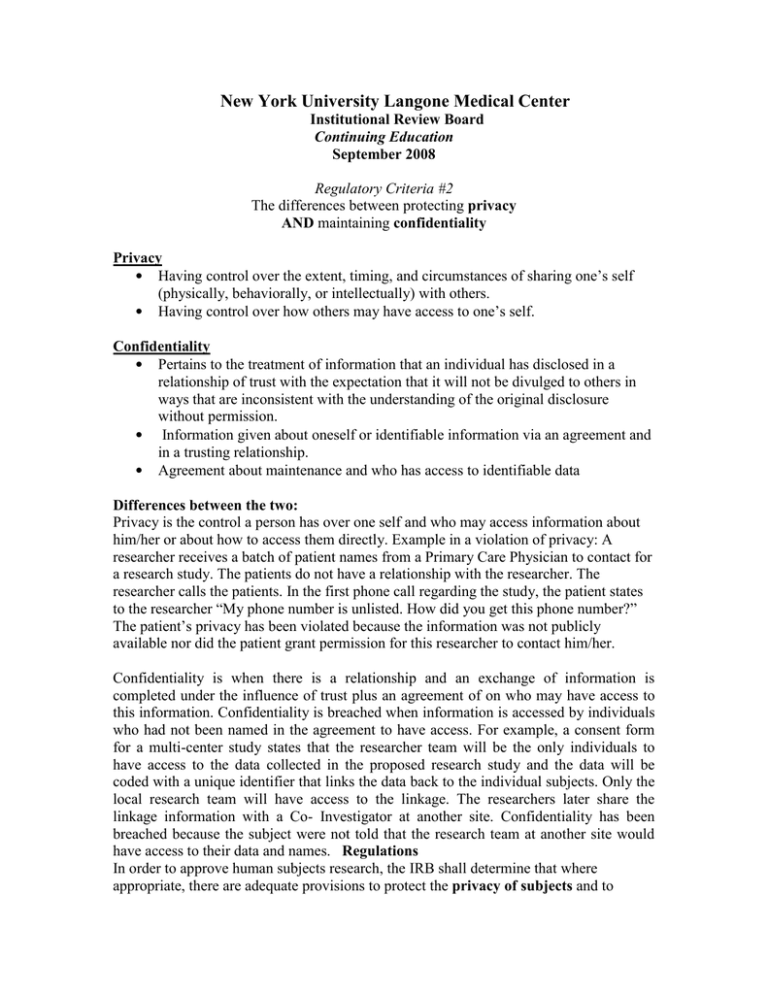
New York University Langone Medical Center Institutional Review Board Continuing Education September 2008 Regulatory Criteria #2 The differences between protecting privacy AND maintaining confidentiality Privacy • Having control over the extent, timing, and circumstances of sharing one’s self (physically, behaviorally, or intellectually) with others. • Having control over how others may have access to one’s self. Confidentiality • Pertains to the treatment of information that an individual has disclosed in a relationship of trust with the expectation that it will not be divulged to others in ways that are inconsistent with the understanding of the original disclosure without permission. • Information given about oneself or identifiable information via an agreement and in a trusting relationship. • Agreement about maintenance and who has access to identifiable data Differences between the two: Privacy is the control a person has over one self and who may access information about him/her or about how to access them directly. Example in a violation of privacy: A researcher receives a batch of patient names from a Primary Care Physician to contact for a research study. The patients do not have a relationship with the researcher. The researcher calls the patients. In the first phone call regarding the study, the patient states to the researcher “My phone number is unlisted. How did you get this phone number?” The patient’s privacy has been violated because the information was not publicly available nor did the patient grant permission for this researcher to contact him/her. Confidentiality is when there is a relationship and an exchange of information is completed under the influence of trust plus an agreement of on who may have access to this information. Confidentiality is breached when information is accessed by individuals who had not been named in the agreement to have access. For example, a consent form for a multi-center study states that the researcher team will be the only individuals to have access to the data collected in the proposed research study and the data will be coded with a unique identifier that links the data back to the individual subjects. Only the local research team will have access to the linkage. The researchers later share the linkage information with a Co- Investigator at another site. Confidentiality has been breached because the subject were not told that the research team at another site would have access to their data and names. Regulations In order to approve human subjects research, the IRB shall determine that where appropriate, there are adequate provisions to protect the privacy of subjects and to maintain confidentiality of data. 45 CFR 46.111(a)(7); 21 CFR 56.111(a)(7). In a protocol, privacy is typically addressed in the recruitment of subjects section while confidentiality is addressed in the section discussing how data collected in the research will be kept confidential (see Section H of the Consent Form template). Important Points for IRB Review of Provisions for Privacy and Confidentiality • The IRB must decide on a protocol-by-protocol basis whether there are adequate provisions to protect the privacy of subjects AND to maintain the confidentiality of the identifiable data at each segment of the research…recruitment to maintenance of the data. • The committee must consider the sensitivity of the information collected and the protections offered the subjects. • Especially in social/behavioral research the primary risk to subjects is often an invasion of privacy or a breach of confidentiality. • During the informed consent process, subjects must be informed of the precautions that will be taken to protect the confidentiality of the data and be informed of the parties who will or may have access (e.g., research team, FDA, OHRP). This will allow subjects to decide about the adequacy of the protections and the acceptability of the possible release of private information to the interested parties. References: IRB 201 Presentation by Jeffrey Cooper, M.D., M.M.M., 2004 and the Institutional Review Board: Management and Function, Amdur and Bankert, 2002 from the University of California at Irvine Office for Human Research Protection - IRB Guidebook http://www.hhs.gov/ohrp/irb/irb_guidebook.htm
